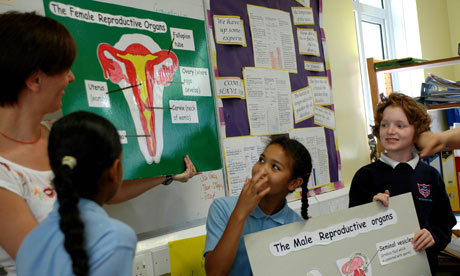Sex education: a few lessons
Most parents apparently believe children should start learning about sex when they're eight – here's why they're right
======================================================

Jane Fae
guardian.co.uk, Monday 25 July 2011 16.05 BST

'Broad and structured sex education will provide grounding in relationships, biology, safety, health, respect for others and consent.' Photograph: David Levene for the Guardian
===============================================================
According to a survey run on the Netmums parenting website, the majority of parents believe children should start learning about sex and relationships when they are eight years old. I can hear them already. The shocked and outraged tones of the other "moral" majority reacting to yet another progressive plot to corrupt children. "We'll have no sex education here!" Or if we must, let them wait until they're actually doing it. That is sad, because such views are themselves transformative, turning sex from a natural and evolving topic to a dangerous threshold, making childhood sexualisation more, not less, likely.
Talking about sex starts much earlier
Children use sexual terms long before they reach the age of eight (year 3). Listening recently to year 1 conversations, I overheard boys talking about "having sex" (they mean "cuddling"). They insult each other using terms such as "gay". Discussion of sex runs through the playground discourse like Blackpool through a stick of rock: it's just very badly formed.
Talking about sex needs to start earlier
A straw poll of local school kids suggests little useful sex education is received before the age of 13. That's two years after the average age at which girls begin their periods – five years after some. If you're not told about such stuff at home, how terrifying to be eight and suddenly bleeding. A range of studies report puberty starting earlier in western societies – and while the reality of sexual experimentation may not be as graphic or extreme as the tabloids would have us believe, that, too, can begin long before 13.
Sexual orientation and identity, too, can be obvious at a very early age (from six onward): once more, how scary to grow in an atmosphere that makes "queers" always the butt of jokes with no balancing official information.
Most parents apparently believe children should start learning about sex when they're eight – here's why they're right
======================================================

Jane Fae
guardian.co.uk, Monday 25 July 2011 16.05 BST

'Broad and structured sex education will provide grounding in relationships, biology, safety, health, respect for others and consent.' Photograph: David Levene for the Guardian
===============================================================
According to a survey run on the Netmums parenting website, the majority of parents believe children should start learning about sex and relationships when they are eight years old. I can hear them already. The shocked and outraged tones of the other "moral" majority reacting to yet another progressive plot to corrupt children. "We'll have no sex education here!" Or if we must, let them wait until they're actually doing it. That is sad, because such views are themselves transformative, turning sex from a natural and evolving topic to a dangerous threshold, making childhood sexualisation more, not less, likely.
Talking about sex starts much earlier
Children use sexual terms long before they reach the age of eight (year 3). Listening recently to year 1 conversations, I overheard boys talking about "having sex" (they mean "cuddling"). They insult each other using terms such as "gay". Discussion of sex runs through the playground discourse like Blackpool through a stick of rock: it's just very badly formed.
Talking about sex needs to start earlier
A straw poll of local school kids suggests little useful sex education is received before the age of 13. That's two years after the average age at which girls begin their periods – five years after some. If you're not told about such stuff at home, how terrifying to be eight and suddenly bleeding. A range of studies report puberty starting earlier in western societies – and while the reality of sexual experimentation may not be as graphic or extreme as the tabloids would have us believe, that, too, can begin long before 13.
Sexual orientation and identity, too, can be obvious at a very early age (from six onward): once more, how scary to grow in an atmosphere that makes "queers" always the butt of jokes with no balancing official information.
Sex doesn't have to be sexual
Many of the dirtiest, smuttiest most adult things about sex are just that: adult. There is a depressing read-across from adult values to child: many people assume that a child doing something "sexy" understands their behaviour and intends the result. Children learn through play. Girls dress, use makeup and dance in ways that would be erotic if their mums did them – but absolutely aren't when they do. Children can be educated about sex without focusing on the erotic.
Many of the dirtiest, smuttiest most adult things about sex are just that: adult. There is a depressing read-across from adult values to child: many people assume that a child doing something "sexy" understands their behaviour and intends the result. Children learn through play. Girls dress, use makeup and dance in ways that would be erotic if their mums did them – but absolutely aren't when they do. Children can be educated about sex without focusing on the erotic.
It's never too young to learn respect
The most misleading thing about this debate is that opponents caricature sex education as being about just one thing. In fact, broad and structured sex education will provide grounding in relationships, biology, safety, health, respect for others and consent. These will be introduced at the appropriate point using language appropriate to the age discovering them. In a world in which many adult relationships continue to be conducted through the emotions of childhood – and one in four women (and one in five men) are still suffering domestic violence – early sex ed is as much about learning the most basic of lessons – the right to say no – as anything else.
The most misleading thing about this debate is that opponents caricature sex education as being about just one thing. In fact, broad and structured sex education will provide grounding in relationships, biology, safety, health, respect for others and consent. These will be introduced at the appropriate point using language appropriate to the age discovering them. In a world in which many adult relationships continue to be conducted through the emotions of childhood – and one in four women (and one in five men) are still suffering domestic violence – early sex ed is as much about learning the most basic of lessons – the right to say no – as anything else.
=================================================
guardian.co.uk/commentisfree/2011/jul/25/
No comments:
Post a Comment